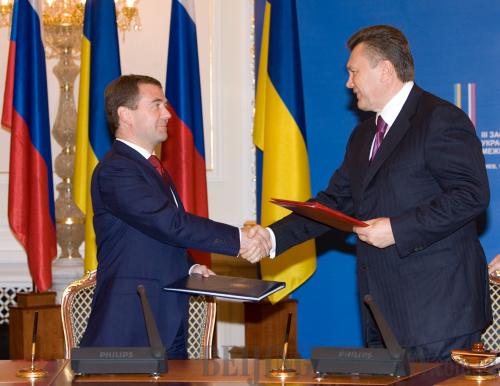|
 |
|
MAKING PROGRESS: Visiting Russian President Dmitry Medvedev shakes hands with his Ukrainian counterpart Viktor Yanukovych in Kiev on May 17 after signing a series of documents on border demarcation as well as cultural and educational exchanges (XINHUA) |
The gas disputes dealt a heavy blow to Ukraine's economy, because of its long-term energy reliance on Russia. After two of the coldest winters on record, Ukrainians began to realize the importance of the Russia-Ukraine relationship. So, in 2010, they voted for Yanukovych instead of Yulia Tymoshenko, who was believed to be pro-West.
The gas dispute had a clear political background. For a long time, Russia sold oil and gas to members of the Commonwealth of Independent States (CIS), including Ukraine, at prices far lower than those it demanded in the world market. It did this to retain strategic interests in the CIS.
After the Orange Revolution, however, Ukraine started to swing toward the West. Enraged by Ukraine's pro-West policies, Russia demanded Ukraine pay the same prices as EU countries. Ukraine refused, and attempted to bargain by raising the rent for the Sevastopol naval base and by hiking transit fees.
Russia's energy policy turned out to be a double-edged sword that hurt Ukraine economically, and damaged Russia's political image as well.
Tackling challenges
Yanukovych now faces serious challenges. Economic recovery and development are at the top of his agenda. Statistics show that in 2009, his country's economy decreased 15 percent from the year before. Ukraine hopes to restart relations with the International Monetary Fund to get the West's loans and Russia's gas. Ukraine's numerous political parties have differing ideas on this issue, though, and that will slow the government's response to economic problems.
When visiting Ukraine in April, Medvedev reached new natural gas and rental agreements with Yanukovych. Ukraine can now buy Russian gas at a 30-percent discount if the world gas price is below $330 per 1,000 cubic meters. If the price rises above that, Ukraine will receive a discount of $100 per 1,000 cubic meters. Ukraine also agreed to extend the Sevastopol lease until 2042. At that point, Ukraine will have the option of extending the lease for five more years.
Yanukovych also expressed support for Russia's initiative to establish a new security system in Europe, saying that Ukraine will participate as a non-ally of any military or political alliance. These agreements were rapidly approved in both countries' parliaments, as they felt cooperation was key to a bilateral relationship.
There are still risks for bilateral relations, though. Political disputes will not disappear simply because Yanukovych came to power. During Yanukovych's Russia visit in March, Deputy Speaker of Russian State Duma Vladimir Zhirinovsky said problems like the Black Sea Fleet were Yanukovych's political bait. The Ukrainian president's goal, he said, was to persuade Russia to continue transporting natural gas through Ukraine.
Ukrainian opposition leader Tymoshenko also made a critical, televised speech, saying Yanukovych was ready to sell state-owned energy transportation systems, including the gas transit system, and calling it a yard sale of the country's national interests.
Medvedev recently announced the country's new diplomatic strategy, which is centered on Russia's modernization. Based on this strategy, Russia considers developing relations with the EU and the United States a priority, while relations with the CIS states, including Ukraine, become less important. This will cause worry and suspicion in Ukraine.
Nevertheless, the two countries are neighbors with extremely close ties and they should strengthen bilateral relationship for geopolitical reasons. An improvement in this relationship will be the result of both governments' reconsideration of their national interests and adjustment of their policies.
In addition, EU members must also cooperate with Russia and Ukraine. Such cooperation will not only benefit the two countries, but will also assist in Europe's political stability.
The author is a professor at China Foreign Affairs University | 